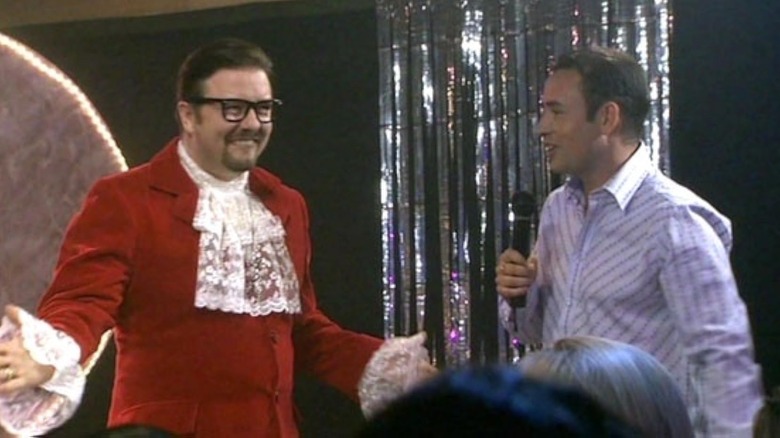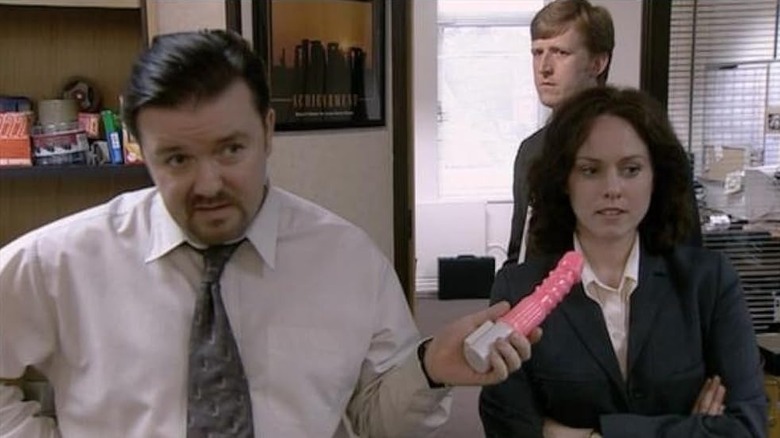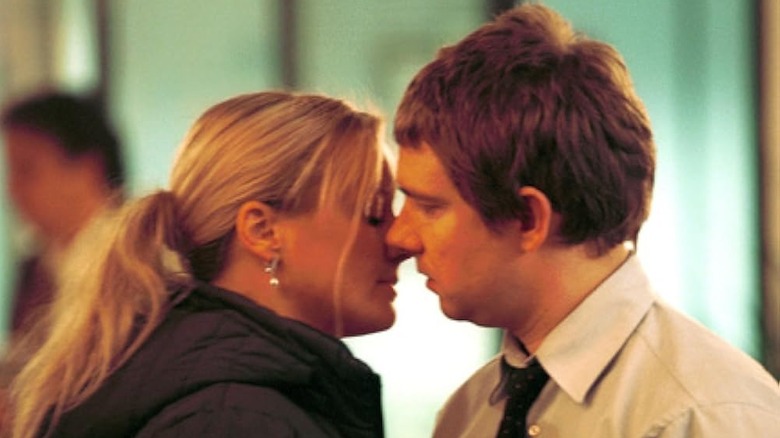The Best Sitcom Of All Time, According To Metacritic
How can any of us define what the best of all time is? For some people, thinking about the best TV show or film of all time is akin to asking them what their favorite within the respective medium is. But to say that something is your favorite film or TV show is not automatically the same as deeming it the best. For some, to be the best means that you have to be influential or that the end result has to have some grand statement attached. And more importantly, if the question "What is the best of all time?" is being asked, do we ask ourselves or do we rely on outside sources?
The voice of the critic is important, but it can also be ignored if a critic doesn't like a show or film the way that we do, or if they just flat-out hate something we adore. But if we accept that critics' voices are worth listening to (which they are), then it comes down to either Metacritic or Rotten Tomatoes in terms of the best options for aggregating tens (and sometimes, in the case of big-budget films, hundreds) of reviews from across the Internet and the globe to identify what may well be the best. Arguably, Metacritic is the better option, for two reasons. First, Metacritic doesn't pull from hundreds of random sources. Often, the reviews it collects, even for the biggest new movie, amount to about 50 or so essays or articles from the true cream of the crop online. And second, because its numbers directly correlate to the ratings that a critic actually assigns (as opposed to its main competition, whose scores simply reflect if a review is generally positive or negative), the combined scores feel more accurate to whether or not a show is actually good.
So, with all that out of the way, the question before us is this: what, according to Metacritic, is the best sitcom of all time? The picture above this may have given you a hint, but if not, let's be clear that the answer is the British version of "The Office," with a 97 score. When it comes to influence, few shows can claim to be as massively impactful (even without realizing it) than "The Office," created and written by Ricky Gervais and Stephen Merchant. For a show with such a deliberately small premise — a documentary crew tracks the day-to-day lives of people working at a paper company in the English town of Slough — "The Office" is a show whose impact spread quickly across the pond to the United States, and continues to have a great impact.
Leave aside the fact that Gervais and co-star Martin Freeman have become internationally known thanks to playing, respectively, pompous and clownish office manager David Brent and the capable and lovelorn paper salesman Tim. You can even leave aside the fact that the show inspired a massively famous American remake that helped Steve Carell and John Krasinski become major stars (for playing the stateside counterparts of David and Tim). Think of how many modern sitcoms, from "Abbott Elementary" to "St. Denis Medical," are essentially derived from the same mockumentary style. "The Office" belongs alongside the handful (at best) of other sitcoms that have truly shaped the genre over the decades.
The Office was a ground-breaking cringe comedy
Honestly, though, even if you forget the influence that "The Office" still wields nearly a quarter century after its premiere in 2001, you're left with an incredibly funny, cringeworthy show that expanded upon the awkwardness of comedy series such as "Seinfeld" and "The Larry Sanders Show" while also creating a compelling will-they-won't-they romance on the outer margins. David Brent is a hopelessly deluded middle manager who doesn't realize how much the majority of the staff at Wernham Hogg can't stand him, his predilection for playing guitar, or his sexist and racist antics. Tim Canterbury is annoyingly good at his job as a paper salesmen, not because the others can't stand him, but because he can't believe this is the job he's chosen to undertake; all that keeps him going is Dawn (Lucy Davis), the attractive and intelligent office receptionist with whom he's besotted in spite of her impending nuptials to an oafish warehouse employee. David's only true ally is Gareth (Mackenzie Crook), an obnoxious and overly officious employee who's mostly good for being pranked ruthlessly by Tim.
For anyone who's more familiar with the U.S. version of "The Office," the key differences between the two shows (and what makes the British original truly stand apart) are twofold: the lack of sentimentality and the brevity of the original series. Both shows' first seasons were six episodes long, but it was only true for the U.S. version because it was a midseason replacement. The British original, because British TV shows typically don't produce many episodes per season, was just 12 episodes long across two seasons, as well as having a Christmas special meant to fully complete the stories of David, Tim, Dawn, and Gareth. If you combined the entire runtime of the British show, it wouldn't surpass a single full season of the U.S. version.
And again, the British show was more than happy to avoid most sentimental moments. Even when Tim initially approaches Dawn to tell her how he feels about her, he does so by taking off his microphone, talks to her in a soundless scene, and when he returns for a talking-head interview, he grabs his mike and quietly says, "She said 'no,' by the way." But the same was true for how the U.S. show fleshed out Michael Scott (Carell), who started very much like David Brent before ending his seven seasons with a tearful send-off to his happily ever after with an ex-employee of Dunder Mifflin.
The Office proves that longer-lived shows aren't always better
It may seem surprising that a) the highest-rated sitcom on Metacritic only got a 97 and b) said show isn't a more famous U.S. program like "Seinfeld" or "The Simpsons." (Fun fact: the highest-rated U.S. sitcom on the site, with a 95, is the aforementioned "The Larry Sanders Show.") In fact, the Brits reign supreme on the website. If you look at the full list of shows Metacritic tracks, the only other series with as high a rating as "The Office" is another British standby, "Planet Earth; Blue Planet II," narrated by David Attenborough. Longevity isn't always a benefit for TV shows; many of the highest-rated sitcoms aren't network stalwarts like "The Big Bang Theory" or "Friends" but more limited-run shows like "The Office" or "Master of None" or "Catastrophe."
The lesson with "The Office," however, is that its initial run was such a striking case of creative lightning in a bottle that it can't possibly be replicated and it can't be topped. Gervais and Merchant did a moderately good job of bringing the cringe-comedy style to HBO with their follow-up show "Extras" (which also benefitted from how many celebrities enjoyed "The Office" and wanted to appear in the writers' next series), but it wasn't remotely as savage or effectively satirical. We can't always agree on much, but utilizing Metacritic to determine what the best sitcom truly is does feel like a smart move, especially when the answer is something that so impressively bridges cultural impact with disturbingly timeless and funny commentary on modern life.


